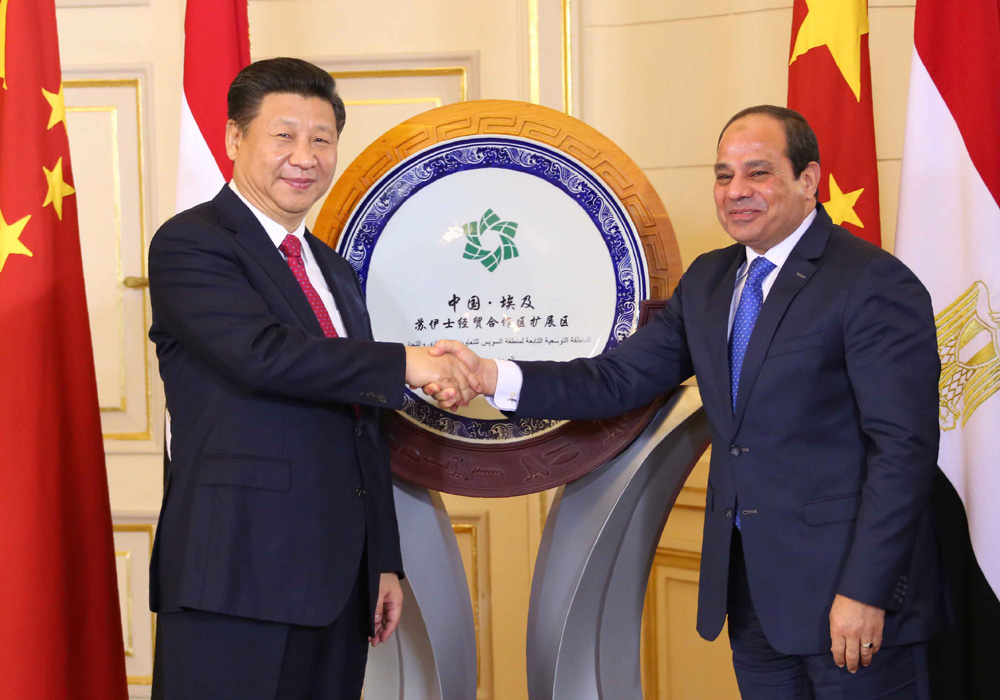Egypt-China ties warming in 60th year

Chinese President Xi Jinping (L) and Egyptian President Abdel Fattah el-Sisi jointly unveil the nameplate of the second-stage project of the China-Egypt Suez Economic and Trade Cooperation Zone on Jan. 21.
The relationship between China and Egypt dates back to the Pharaonic era. The Silk Road played a great role in enhancing exchanges and cooperation between ancient civilizations in trade, culture and many other fields. Archaeologists also discovered that the aristocrats in ancient Egypt once wore Chinese silk as a symbol of prestige.
And in the modern age, Egypt was the first Arab and African country to establish diplomatic relations with China.
The bilateral relations have developed well over the past 60 years in all fields. A major breakthrough came in 2014, during President Abdel Fattah el-Sisi’s first visit to China, when it was agreed that the relationship would be elevated to a comprehensive strategic partnership.
Extensive cooperation
Regarding business and trade, China is Egypt’s second-largest trade partner. Bilateral trade amounted to $11.5 billion in 2015, of which Egyptian exports to China accounted for $1 billion and imports from China accounted for $10.5 billion, according to government figures. We would like to see more balanced trade ties, but that does not mean we want to reduce Chinese exports to Egypt. On the contrary, we want to enhance and increase the Egyptian exports to China.
In the field of media and mass communication, we find that the most important Chinese media outlets have regional offices in Egypt. We have Xinhua News Agency, People's Daily, Guangming Daily and CCTV. Also, a memorandum of understanding for media cooperation has been signed between the State Information Service in Egypt and China's State Council Information Office.
In politics, Egypt is an important player in the Middle East, Africa and the Islamic world. We cooperate with our Chinese friends on different regional and international issues. Egypt welcomes China to play a bigger role in the international and regional arena and to be a mediator to settle disputes because it is well known that China always adheres to the principles of the United Nations Charter, respects state sovereignty and follows the policy of non-interference.
Another area of cooperation is counterterrorism. Terrorism has become the most vicious menace nowadays. No country is immune from the dangers of terrorism. So cooperation and the exchange of experience are very important elements of combatting terrorism.
There are many other fields of interest, such as infrastructure, technology, agriculture and renewable energy.
Finally, I have to say that not only Egypt but the developing world and the world as a whole could learn a lot from the Chinese experience and the Chinese Dream.
Opportunities
There are a plethora of opportunities in the relationship. We do not have conflicting interests, so cooperation is the salient feature of our relations.
Cooperation with Egypt involves many opportunities for China and the Chinese people. Egypt offers many investment opportunities. After four years of turbulence, Egypt has managed to get back on track. It wants to revitalize its infrastructure and extend infrastructure services to new areas to pave the way for a new revival.
Egypt has announced a number of investment projects, and there are many others to come, such as the Suez Canal Corridor Development Project, a large-scale project designed to relieve congestion in Cairo. This megaproject will attract many companies in different fields, such as infrastructure, housing and communications.
Cooperation with China involves many opportunities for Egypt. China managed to achieve an economic miracle in a relatively short period of time. There are many similarities between the situation in Egypt now and the circumstances in China a few years ago. We can learn many lessons from the Chinese experience.
There are useful lessons in the Chinese story about eradicating illiteracy and creating job opportunities. The urbanization movement in China is also a unique experience.
B&R, new Suez Canal
Egypt welcomed the announcement of the “Belt and Road” initiative in September 2013 as an opportunity for the underdeveloped countries to join the train of development. It was clear that China has taken the lead in restoring and rejuvenating a much-needed corridor for cooperation, communication and exchanges that connects many countries and enables people to make valuable contributions to the development and prosperity of mankind just as their ancestors did for centuries in the past.
Egypt is an integral part of the initiative. Its location at the intersection of three continents as well as the establishment of the new Suez Canal, makes it an important station along the road. Egypt will also benefit from the initiative. The principle of mutually beneficial cooperation makes each party a winner. Egypt needs foreign investment, infrastructure projects, a revival of the tourism sector, new markets for its products, among many other things, and the initiative opens new horizons for all participants.
The new Suez Canal shares some characteristics and objectives with the Silk Road. Both will help international trade and the global economy recover from the sharp slowdown. They are complementary and integrated. The “Belt and Road” initiative is China’s gift to the world to help the underdeveloped regions revive and flourish in a peaceful way. This is also the aim of the New Suez Canal project.
Both projects will help the comprehensive strategic partnership between Egypt and China and open new horizons for them.
We are confident that the cooperation between Egypt and China is a mutually beneficial partnership, and the outcome of this cooperation will extend far beyond the two countries.
Huda Jadalla is a counsellor and head of the Press and Information Office at the Egyptian Embassy to China.
